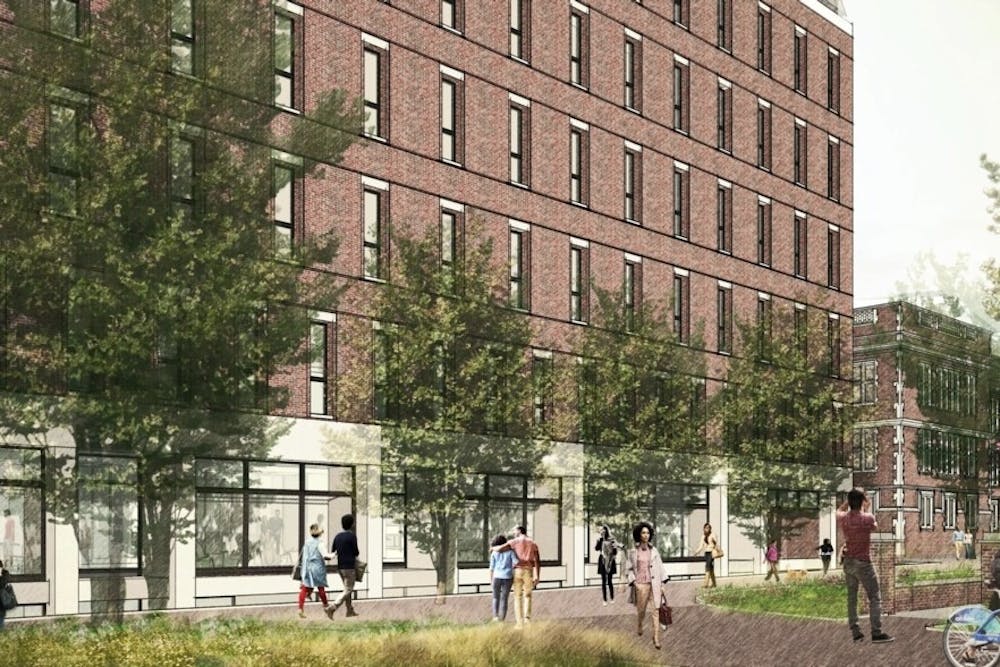Penn's Biomedical Library will debut a new name and renovated space in time for the fall semester.
The space will soon be known as the Biotech Commons and is set to feature new collaboration spaces, expanded study rooms, and a digital fabrication lab with 3D- and poster-printing capabilities. The renovations, which began in December 2020, are expected to be completed in August or September 2021.
The Biomedical Library is located on Hamilton Walk, near the School of Nursing and the Quad. Barbara Cavanaugh, former director of the Biomedical Library and current associate university librarian for Research Services & Science and Business Libraries, said that the new space will aim to be more of an interdisciplinary hub while maintaining its health sciences expertise. The library's new name will reflect that there are engineering librarians on site, Cavanaugh added.
The renovations will total $11.5 million, Jennifer Rizzi, Facilities and Real Estate Services director of communications said. The money came from a combination of private donations and contributions from the Perelman School of Medicine, the Nursing School, the Provost's Office, and Penn Libraries, Communications Coordinator at Penn Libraries Monica Fonorow said.
The library's renaming reflects a new chapter in the library's evolution and is intended to draw attention to the library's new aims, Cavanaugh said.
“[Biotech] helps draw attention to the fact that we're trying to be more of an interdisciplinary hub across campus. [Commons] draws attention to the collaborative focus of the new facility,” Cavanaugh said.
Hannah Rutledge, the newly appointed director of the Biomedical Library, said the renovations will focus on enhancing the visitor experience in the library.

The Biotech Commons will feature collaboration spaces, expanded study rooms, and a digital fabrication lab with 3D- and poster-printing capabilities.
RELATED:
Here’s what you need to know about the upcoming Quad and Stouffer renovations
Gregory College House to get air conditioning by May 2021, nine months behind schedule
The brick walls along the Hamilton Walk facade will be replaced by windows to increase the natural light coming into the space, Rutledge said, adding that the portraits on the walls of previous faculty and deans of the Medical School will be supplemented with additional art.
The number of study rooms will be expanded from the previous four to 20, each with a capacity for four to eight individuals, Rutledge said.
The Biomedical Library was not previously conducive to quiet study, Cavanaugh said.
"I think there [was] a lot of competition across the library for quiet spaces versus collaborative spaces, and we only [had] a handful of study rooms," she added.
In addition to individual study spaces, the Biotech Commons will feature an enclosed glass space where events can be held without disrupting the students who are trying to study quietly, Cavanaugh said. Some current features, such as the relaxation room, will be carried over to the new space.
“Finally, the facility is going to match the caliber of the staff," Cavanaugh said.
Rutledge and Cavanaugh emphasized that the Biotech Commons will be accessible to all Penn students once it opens, although capacity may be limited due to COVID-19 restrictions.
"I'm not sure if we'll need to restrict [entry] to just Penn students [when we reopen]. My guess is that we probably will, in the beginning, but I don't anticipate restricting just to certain categories of students or anything like that," Cavanaugh said.
“We are going to be open to all and we want it to be a true community space. It'll be a very welcoming, very engaging space that we hope will inspire and engage students [in] their learning and their discovery,” Rutledge said.









